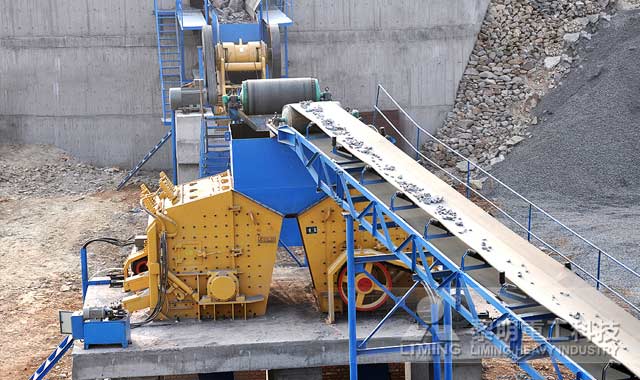When considering the purchase of stationary crushing equipment, it’s crucial to assess your specific needs, the type of material you’re processing, and the overall scale of your operation. Stationary crushing equipment is typically more robust and can handle larger volumes of material than mobile crushers, making it ideal for heavy-duty, long-term projects in industries such as mining, aggregate production, and recycling.

Types of Stationary Crushing Equipment
- Jaw Crushers: Jaw crushers are among the most common types of primary crushers used in various industries. They work by compressing large rocks between two jaws, one of which is fixed while the other moves. These machines are ideal for crushing hard materials like granite, basalt, and iron ore. Jaw crushers are known for their simplicity, durability, and efficiency, making them a popular choice for primary crushing.
- Gyratory Crushers: Gyratory crushers are also used in primary crushing and are suitable for crushing very hard and abrasive materials. They operate on a similar principle to jaw crushers but with a gyrating spindle that crushes the material in a conical chamber. Gyratory crushers can handle larger feed sizes and produce a more uniform product size.
- Cone Crushers: Cone crushers are used for secondary or tertiary crushing, where more precise material size reduction is needed. They crush the material between a stationary and a moving cone, which is slightly off-center. Cone crushers are particularly effective in processing medium to hard materials like limestone, granite, and copper ore. They offer a high reduction ratio and produce a cubic-shaped product.
- Impact Crushers: Impact crushers are versatile machines that can be used for primary, secondary, or tertiary crushing, depending on the configuration. They use impact rather than pressure to crush materials, making them suitable for softer materials like limestone or for recycling applications. Impact crushers can produce a more uniform particle shape, which is often desirable in construction materials.
- Vertical Shaft Impact (VSI) Crushers: VSI crushers are used in the final stage of crushing to produce high-quality, cubical-shaped products. They are particularly effective in producing fine aggregates and sand, especially in the production of asphalt and concrete materials.
Key Considerations When Buying Stationary Crushing Equipment
- Capacity: Consider the production capacity you require. Stationary crushers come in various sizes and capacities, so it’s important to match the equipment with your operation’s needs. Overestimating your capacity needs can lead to unnecessary costs, while underestimating can lead to inefficiencies and production bottlenecks.
- Material Characteristics: The type and hardness of the material you’re processing are critical factors. Ensure that the crusher you choose is capable of handling the specific material type, whether it’s hard rock, ore, or softer materials like limestone.
- Installation and Maintenance: Stationary crushing equipment typically requires a more involved installation process compared to mobile units. Consider the foundation requirements, electrical needs, and maintenance access. Additionally, easy maintenance and availability of spare parts should be a priority to minimize downtime.
Selecting the right stationary crushing equipment is critical for the efficiency and profitability of your operation. Whether you need a jaw crusher for primary crushing or a cone crusher for secondary processing, understanding the specific requirements of your material and operation will guide you to the best choice. Always consider the long-term operational and maintenance aspects to ensure your investment yields the best possible returns.

